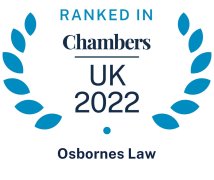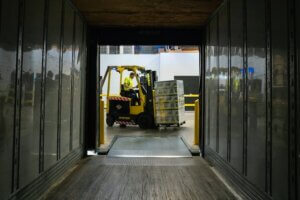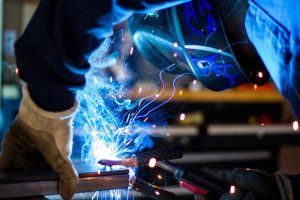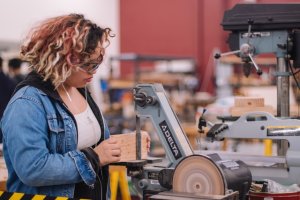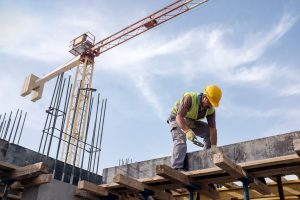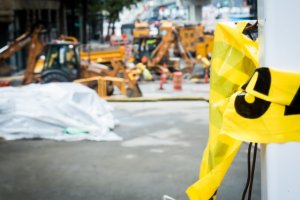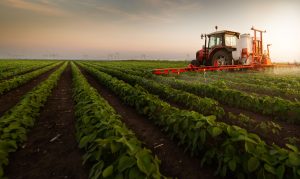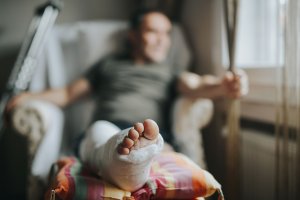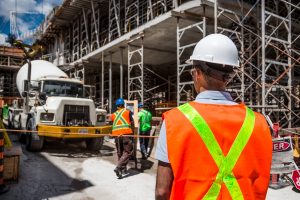Industrial Injury Claims
Make an Industrial Injury Claim
The mixture of machinery, hazardous substances and working nearby means that factory workers are at risk of injury. Our personal injury lawyers, specialise in Industrial Injury Claims. We will guide you through the process of claiming compensation.
How to Make an Industrial Injury Claim
The manufacturing industry employs 10% of the British workforce but accounts for 25% of all fatal workplace accidents and 16% of reported accidents at work.
The factory can be a dangerous environment and whilst there have been improvements in worker safety over recent decades there is still room for improvement.
The main source of safety improvements has been the imposition of European legislation over the last 20 years, which was built on the 1961 and 1974 Factories Acts. This legislation covers a wide area of activities in the workplace and ensures that risk assessments are at the centre of operations.
Machinery injuries and strict liability
In factories, machinery poses a particular risk. The regulations mean that if machinery is defective, for whatever reason, and this causes injury to a worker, then the employer will be liable to pay compensation for those injuries. This is one of the few examples of ‘strict liability’ in UK law, where it is not necessary to prove fault on the part of the defendant. Strict liability is imposed in this situation for the protection of workers – there is an inequality of status between the employee and employer, which would make it difficult for the employee to produce the necessary evidence to prove that a machine malfunctioned because of some negligence on the part of the employer.
So for example, Osbornes made an Industrial Injury claim for Mrs V, a Bulgarian lady who worked in an industrial bakery in London and spoke little English. She was operating a machine on the production line, a machine she was trained on and had no problems with before, when suddenly and without warning part of the machine, a metal block, swung out and hit her on the head, throwing her across the factory floor and knocking her out. She was unable to say what the part was and how or why it ejected from the machine and she had no details of witnesses. Proving fault on the part of her employer would have been extremely difficult, but because the machine had malfunctioned the employers were strictly liable and so she was compensated for the head injury that interfered with her work for the next three years.
Strict liability does not apply to most other work activities, so for most employees, it is necessary to prove the cause of an accident and to show that the employer was at fault in some way. Fortunately, other regulations help, because they impose various safety duties on employers. Legislation controls how machinery and other work equipment is used and how the factory is organised so that worker safety is taken into a consideration. For example, many factories have vehicles such as forklift trucks and pallet trucks moving about on the ‘shop floor’ and there are rules about how pedestrian walkways should be used to keep traffic away from pedestrians. This is an elementary safety procedure but it is surprising how many cases we come across where a factory worker has been injured by a vehicle that has been allowed to operate in an area where pedestrians are moving about.
Hazardous and toxic substances are often used in the manufacturing process, and there are regulations designed specifically to control their use to minimise the dangers to health and safety.
Common sense approach to industrial injury claims
Much is said about the ‘health and safety culture’ and the need to apply a common-sense approach to risks and to reduce the burden of bureaucracy. This may be true in some areas, but in the factory setting, there must be proper rules, strictly applied, to make sure that employers take their responsibilities for worker safety seriously. So it is a real concern that the Government has rushed through parliament an amendment to the Enterprise Bill to prevent injured workers from relying on the safety regulations in a compensation claim. If the amendment is made law accident victims will once again have to rely on proving negligence by their employers and we will be left with a Victorian-style safety regime where it will be much more difficult to succeed with an Industrial Injury against an employer.
Contact us today
For a free initial conversation call 020 7485 8811
Email us Send us an email and we’ll get back to you
“Thank you and thank you once again for all your hard work and support through it all. ”
David Leadercramer has experienced it all and uses this experience to help guide clients towards the best outcome.
Breadth of knowledge and willingness to go the extra mile is what makes it stand out. Mark Freedman – devoted to his clients
Many thanks for everything - your patient help throughout this process has been really appreciated.
Emily was brilliant
Client Stories & News InsightsVIEW ALL
- 11.4.2023
£250,000 settlement for client injured in forklift truck accident
Sophie Davies, a specialist personal injury lawyer at Osbornes Law, recently represented a client who suffered life-changing injuries following a...
Read more - 30.3.2023
Accident at Work Client Stories
£20,000 for Industrial Injury Claim Enviro-Strip (UK) Ltd have been ordered to pay £20,000 in accident at work compensation after a worker...
Read more - 17.11.2021
£100,000 settlement for tripping at work
Osbornes Law secures £100,000 settlement for Hungarian woman who tripped over a shopping bag at work Siobhan McIvor, a Partner in...
Read more - 17.11.2021
£165,000 settlement for factory accident
Siobhan McIvor, a Partner in the Personal Injury Department of Osbornes Law, has settled a £165,000 accident at work claim, with...
Read more - 31.8.2021
Kitchen Accident Claim
Our client, a hospitality supervisor instructed Osbornes after he slipped and fell on oil and food debris on the floor...
Read more - 18.5.2021
Construction Site Accident at Work
Our client suffered numerous fractures to their left leg requiring surgery following a work accident on a construction site. He...
Read more - 18.5.2021
Compensation Awarded Following Amputation Accident on Construction Site
Our client worked as a carpenter/bricklayer on a building site at a residential property in North London. He was...
Read more - 5.1.2021
Farming accidents high risk for self-employed
Agriculture represents a dangerous industry in the UK, and according to the Health and Safety Executive’s report 2020/2021, farm deaths...
Read more - 15.10.2020
Fatal Accidents In The Workplace
A new article from the BBC takes a looked at fatal accidents at work. The report states that since 1981, there...
Read more - 2.9.2020
Lasting damage to ankle following construction accident settles...
Sam Collard, a Partner in the Osbornes’ catastrophic injury team, recently settled a construction accident claim for a Romanian man...
Read more - 29.6.2020
The Dangers of Working on Farms
According to the Health and Safety Executive, over the last 10 years, almost one person a week has been killed as...
Read more - 19.6.2020
Changes to employer’s liability for work accidents
As it now stands employers are automatically liable for some workplace injuries, (without the Claimant having to prove “fault”) is...
Read more - 13.8.2019
Basement fatality convictions highlight health and safety regulations
Conrad Sidebottom, 46, and Richard Golding, 43, were jailed for their part in causing the death of Anghel Milosavlevici. Osbornes Law partner...
Read more - 13.8.2019
Boatyard worker awarded multi-million pound settlement
A boatyard worker who was injured in a workplace fall has been awarded a compensation settlement worth £7.2 million. Kevin Cleightonhills,...
Read more - 18.7.2019
Workplace fatalities creeping up again!
This month the government released the latest Health and Safety Executive (HSE) report, ‘Workplace fatal injuries in Great Britain in 2019’....
Read more

